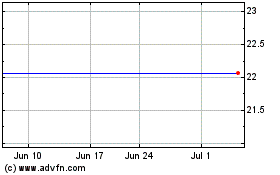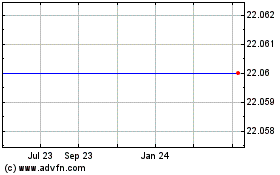Judge Approves New Bankruptcy Loan For General Growth
July 22 2010 - 1:24PM
Dow Jones News
A judge Thursday approved General Growth Properties Inc.'s (GGP)
request to replace its current bankruptcy loan with a new, more
interest-friendly one from Barclays Bank PLC (BCS, BARC.LN).
The Barclays financing, approved by Judge Allan Gropper of the
U.S. Bankruptcy Court in Manhattan, replaces an existing $400
million loan from a group led by hedge fund manager Farallon
Capital Management LLC, which last summer won a three-way fight for
the right to provide the mall operator with debtor-in-possession
financing.
The Barclays loan will mature on May 16, 2011, and includes an
interest rate reduction that would save General Growth about $2.7
million per month. The loan will be initially issued by Barclays,
and then later assigned to investors in General Growth's
bankruptcy-exit plan. No parties objected to the new DIP loan.
General Growth, which owns or manages more than 200 U.S.
shopping malls, filed for bankruptcy protection in April 2009. The
company plans to exit Chapter 11 protection later this year under a
plan backed by a group of investors led by Brookfield Asset
Management Inc. (BAM, BAM.A.T).
The investors have agreed to pump $8.55 billion in General
Growth, which would be split into two public companies upon its
exit from Chapter 11 protection. One of the companies will get
General Growth's more than 180 shopping malls, while the other will
serve as a holding company for real-estate properties such as
master-planned communities and mixed-use projects.
Gropper also ruled in favor of heirs of billionaire Howard
Hughes in a dispute about how their claims should be valued. A
lawyer for the Hughes heirs argued that appraisers, and not
bankruptcy court, should be charged with valuing their claims.
The Hughes heirs' most lucrative claim is about half the value
of 8,900 acres of undeveloped land in the Summerlin project, a
planned community and housing development in Nevada, held by
General Growth. The heirs say that land could be worth more than $1
billion, but General Growth has said it's worth far less.
The heirs are owed payments under a deal stemming from the Rouse
Co.'s 1996 acquisition of the Hughes Corp. General Growth later
acquired Rouse and assumed the obligations under that deal.
General Growth's lawyers argued that a court-controlled
estimation process would be faster, and asked the judge to
determine the value. "We think the estimation process provides a
fair mechanism for doing it," said General Growth lawyer Adam
Strochak of Weil, Gotshal & Manges.
Steven Hoort of Ropes & Gray, representing the Hughes heirs,
said the Summerlin contract with Rouse Co. calls for a panel of
three appraisers, and that the objections that would be filed in a
court-run estimation process would bog the case down.
Gropper agreed, saying the court's job was to move the
bankruptcy process along.
Hoort also disagreed with the involvement of the committee
representing General Growth's shareholder, which has an appraiser,
in the appraisal process. Gropper said he hoped that the equity
committee could participate in the appraisal process, but wouldn't
be forced to.
In ruling for the appraisal and adjourning General Growth's
request for court-controlled estimation, Gropper said, "The Hughes
heirs are hopefully happier claimants."
About the contract with Rouse, Gropper said, "It also seems to
the court that it might be important for the debtors to follow the
contract as precisely as possible."
The estimate that General Growth was asking for could eventually
be used, Gropper said, possibly in conjunction with the appraisal
process.
(Dow Jones Daily Bankruptcy Review covers news about distressed
companies and those under bankruptcy protection.)
-By Joseph Checkler, Dow Jones Daily Bankruptcy Review;
212-416-2152; joseph.checkler@dowjones.com
GGP Inc. (NYSE:GGP)
Historical Stock Chart
From May 2024 to Jun 2024

GGP Inc. (NYSE:GGP)
Historical Stock Chart
From Jun 2023 to Jun 2024
